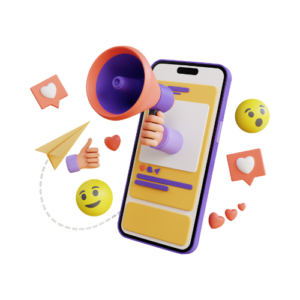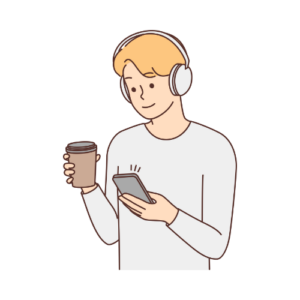
In the realm of mental health, reaching those who need it can be challenging, with many individuals not seeking professional help. To address this, mobile apps have become a popular avenue for delivering mental health support. In a recent study, “The effects of app-based mindfulness practice on the well-being of university students and staff,” researchers investigated the effectiveness of a mindfulness app, revealing promising but nuanced results that highlight the potential benefits of active engagement with mindfulness interventions on psychological well-being.
In the mental health field in Australia we have a challenge where ~ 50% of those struggling with mental ill health don’t seek out the services of a professional (e.g. GP, psychologist, psychiatrist). There are many factors driving this. Some reside in the individuals themselves such as being embarrassed to seek help. Some relate to the systems of care such as accessibility of services. Some are cultural, such as stigma about mental health conditions and prizing independence.
Thus, we are always on the lookout for cost-effective, accessible, scalable, and complementary ways of getting mental health care to people that are engaging and people can consume in their own time, and at their own pace.
When I was training to be a psychologist (in the early 2000’s) this took the form of self-guided workbooks. These were (are) books that guide readers through therapeutic exercises designed by therapists to help them address different mental health concerns. Such books still exist and there is a publisher that focuses on such books. I still recommend these as excellent ways for people to learn more about how to look after their mental health and recover from mental ill health.
Nowadays, with the mobile phone revolution well and truly in place, many people are accessing such self-help tools via apps. There are thousands of mental health and wellbeing focused apps in both the Apple and Android marketplaces. A popular subset of those apps are mindfulness and meditation apps. These apps range from simply providing a catalogue of different guided meditations through to full courses that traverse many different meditation topics.
Some have actually been evaluated and shown to provide some mental health benefit. They include Headspace, Calm and Smiling Mind. But most mental health and meditation apps remain untested, thus there is an ongoing need for studies exploring who and what these apps are useful for.
That brings us to the article I am digesting today. “The effects of app-based mindfulness practice on the well-being of university students and staff” by Lahtinen, Aaltonen, Kaakinen, Franklin & Hyönä was published in Current Psychology in 2023.
The authors conducted a decently sized randomized controlled trial (RCT) of the Welzen mindfulness app in university staff and students at the University of Turku in Finland. 561 staff and students volunteered for the trial and were randomly allocated to either 4 weeks of using the app (the intervention) or 4 weeks of access to short lectures on mindfulness practice (control group). The researchers were looking to see if those accessing the app showed greater improvements in stress, depression, anxiety and mindfulness than those receiving the lectures. An underlying hypothesis was that actively engaging participants in mindfulness training/practice would be superior to just passive learning about mindfulness.
Participants in the intervention and control groups were assessed in terms of stress, depression, anxiety, and mindfulness 4 weeks apart, with the intervention and control resources provided in-between.
So what happened?
Around 25% of the control group dropped out versus 30% of the intervention/app group. This might sound high but is common when we are talking about self-guided resource usage.
Participants in both conditions demonstrated meaningful improvements in stress, anxiety and depression 🥳 Those using the app showed slightly better outcomes in terms of stress and depression. The additional improvement was classified as ‘small’ and whilst statistically significant (i.e. unlikely due to chance), it isn’t clear whether this would be noticeable experientially.
This is where things get a bit weird.
Across both groups, participants’ self-reported mindfulness increased over the 4 weeks suggesting both the app and lectures had an impact ✔

Those who reported higher levels of mindfulness at the second measurement point (i.e. after receiving the app or lectures) showed greater improvements in stress and depression ✔
Those who used the app more regularly showed greater increases in mindfulness ✔
But what wasn’t seen was a strong signal that:
app use –> mindfulness increase –> reduced stress and depression
If you are having a hard time mentally parsing that out, don’t worry, so am I.
In essence I think we see good evidence that active mindfulness interventions are better than passive ones for improving psychological outcomes but it is unclear to what extent increases in mindfulness and time spent engaging with the interventions are important.
What I take away from this study?
One of the authors’ goals for this study was to conduct a well-designed RCT, capable of properly testing the potential benefits of a mindfulness-based app. I think on that front, it is a success. This study adds to a growing collection of such studies which will inform future reviews. With that in mind, you might find this 2021 meta analysis of mindfulness apps interesting.
As for whether this data would convince me to recommend the specific app, I am not sure. This study’s data says to me that engaging with the concept of mindfulness, even for a little as 10 minutes per day over 4 weeks (through app or lectures) might have positive psychological effects. The app showed slight superiority, maybe because of its more active approach but the effect is small over a short time frame like 4 weeks.
So my recommendation, at this stage, is that those of you interested in improving your mental health, may find value in exploring mindfulness and mindfulness meditation, and that it is worth aiming for at least 4 weeks of daily short practice to see if it is for you. Utilising one of the tested apps like Headspace, Calm and Smiling Mind would be a smart starting point and the more actively you can engage, that is, doing meditation versus just learning about it, is likely to produce better outcomes. Keep in mind that the benefits are likely to be modest and shouldn’t replace care that you are receiving from a mental health professional. 
Students at Flinders should be aware that meditation sessions are conducted at Oasis on a regular basis and that two of our wellbeing programs: Be Well Plan and Mindfulness for Academic Success include exploration of mindfulness practices.

